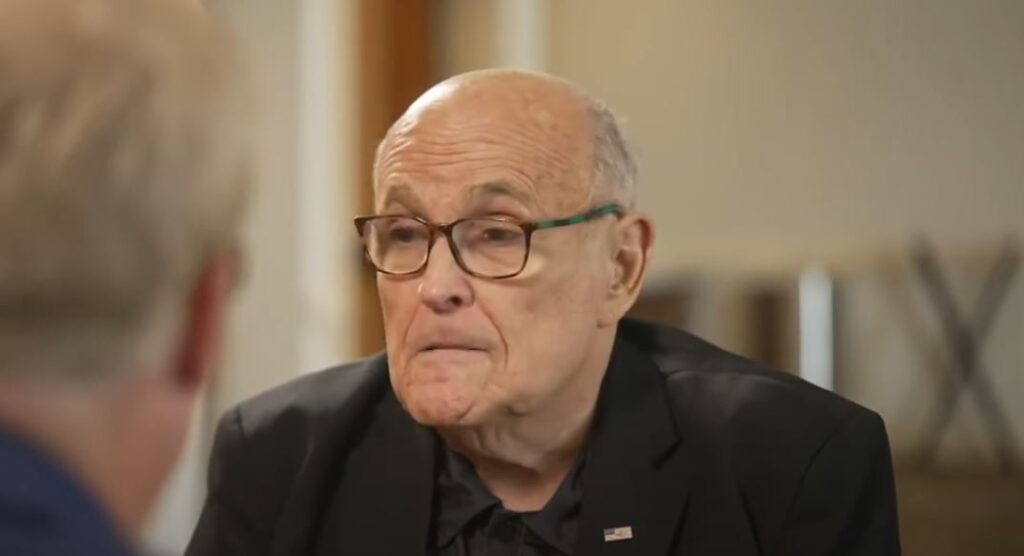
Rudy Giuliani’s life took a drastic turn on a humid Saturday night in New Hampshire when a Honda HR-V rear-ended the Ford Bronco he was riding in. Both cars were severely damaged in the collision, which forced them into the median. After being taken to a trauma center, Giuliani, 81, was diagnosed with a fractured thoracic vertebra, cuts, and bruises all over his body that provided a startlingly clear image of the force of the collision. Surprisingly, though, his team told the public that he was in good spirits and already focused on getting better.
The sequence of events leading up to this accident was almost cinematic. Giuliani had stopped a few minutes earlier to assist a woman who reported him as a victim of domestic abuse. After dialing 911 and waiting for troopers to arrive, he resumed his journey. Unfortunately, a 19-year-old driver hit his car just as he was backing up onto Interstate 93. In keeping with the civic-minded persona he once exhibited while serving as mayor, the scene in which he helps a stranger only to find himself in need of assistance added a particularly moving depth to the narrative.
| Category | Details |
|---|---|
| Full Name | Rudolph William Louis Giuliani |
| Date of Birth | May 28, 1944 |
| Age | 81 |
| Place of Birth | East Flatbush, Brooklyn, New York, USA |
| Profession | Politician, Former Lawyer, Businessman, Media Figure |
| Political Affiliation | Republican Party |
| Key Roles | Mayor of New York City (1994–2001), U.S. Attorney for Southern District of New York (1983–1989), Associate Attorney General (1981–1983) |
| Known For | Leadership during 9/11, later role as Donald Trump’s personal attorney |
| Spouses | Regina Peruggi (1968–1982), Donna Hanover (1984–2002), Judith Giuliani (2003–2019) |
| Children | Andrew Giuliani, Caroline Giuliani |
| Recent Event | Car accident in New Hampshire, August 2025; fractured vertebra, injuries to arm and leg |
The accident seemed both symbolic and profoundly humanizing for a person who had long been known for his tenacity. After the 9/11 attacks, Giuliani was once seen walking calmly through the dust-filled streets of Manhattan. Decades later, pictures of him paralyzed in a hospital bed served as a reminder to onlookers that even powerful figures can be suddenly threatened by everyday threats. The fact that his son Andrew, who is also politically active, thanked well-wishers right away highlights how profoundly personal crises cut across party lines.
The crash’s timing couldn’t have been more intricate. In recent years, Giuliani has been embroiled in a growing number of legal disputes, ranging from professional disbarment to defamation rulings connected to fraudulent election claims. The public’s opinion of him has fluctuated greatly; some believe that controversy has weakened a once-great leader. However, those divisions were temporarily loosened by the accident. While Donald Trump himself sent a brief statement wishing him strength, political rivals also sent their condolences. The poison of partisanship noticeably subsided in that instant, to be replaced by compassion.
Naturally, comparisons to other political figures surfaced. Ted Kennedy’s path was irrevocably altered by his 1969 accident at Chappaquiddick, while more innocuous events involving individuals such as John McCain demonstrated individual fortitude. Giuliani’s crash fell into the latter group because it lacked any scandalous overtones. There was only an unexpected collision that left an octogenarian bruised but alive—no drunkenness, no careless driving, no fatalities. The story had a surprisingly hopeful edge because of that distinction.
According to medical professionals, a fractured vertebra can be especially incapacitating for a person Giuliani’s age. Months of rehabilitation are frequently needed for recovery, and complications are still a possibility. However, his team depicted him as being exceptionally adept at adjusting to the situation, indicating that the incident did not depress him. In this sense, his mishap might even strengthen the public’s perception of Giuliani as a resilient man who has been beaten but not defeated.
Additionally, the accident illuminated more general societal problems. Giuliani’s case highlighted the significance of mobility, aging, and public life, as statistics show that older adults are much more likely to be involved in auto accidents. It was a reminder of how quickly things can change for an 81-year-old who is still actively involved in media and political work. Debates concerning the suitability of aging leaders, ranging from Donald Trump to Joe Biden, have intensified in recent years. That larger conversation is remarkably consistent with Giuliani’s hospitalization.
The setting and the situation struck observers as ironic. Earlier in the evening, Giuliani had gone to a minor league baseball game while in New Hampshire for meetings. The fact that a man who had previously stood shoulder to shoulder with presidents and world leaders was now spending his evening at a ballgame before being admitted to the hospital hours later provided a remarkably commonplace backdrop for the episode. These contrasts—the clash of great status and common vulnerability—are what give such events their public resonance.
Culturally speaking, Giuliani’s vehicle accident also brought to mind the slasher movie I Know What You Did Last Summer, which featured Freddie Prinze Jr., his son-in-law by marriage, in a storyline that follows a car accident that turns tragic decades ago. The irony of Giuliani’s near-fatal crash being reported the same week that I Know What You Did Last Summer was re-released in theaters did not escape the notice of commentators. Even though they are coincidental, these links highlight how politics, celebrity, and accidents frequently converge in ways that the general public remembers.
It’s unclear how the accident will affect Giuliani’s legacy in the long run while he heals. It might end up being forgotten in the midst of his ongoing legal troubles. Conversely, it might act as a powerful reminder of his humanity, tempering the more severe verdicts of the past few years. The way leaders handle crises, even personal ones, is frequently remembered in history. Giuliani might be able to remind some people of the grit that used to define him by displaying optimism while he recovers.
